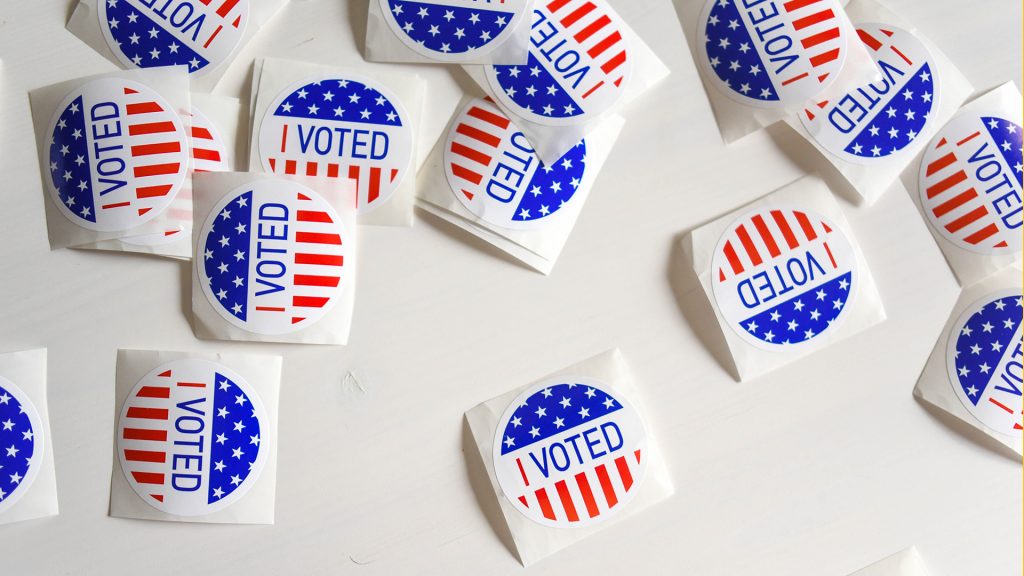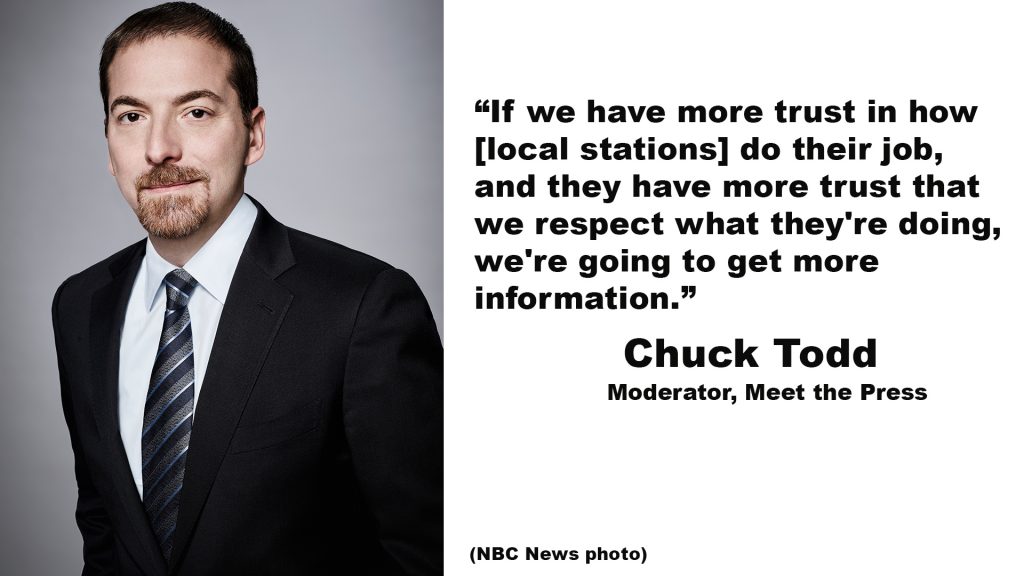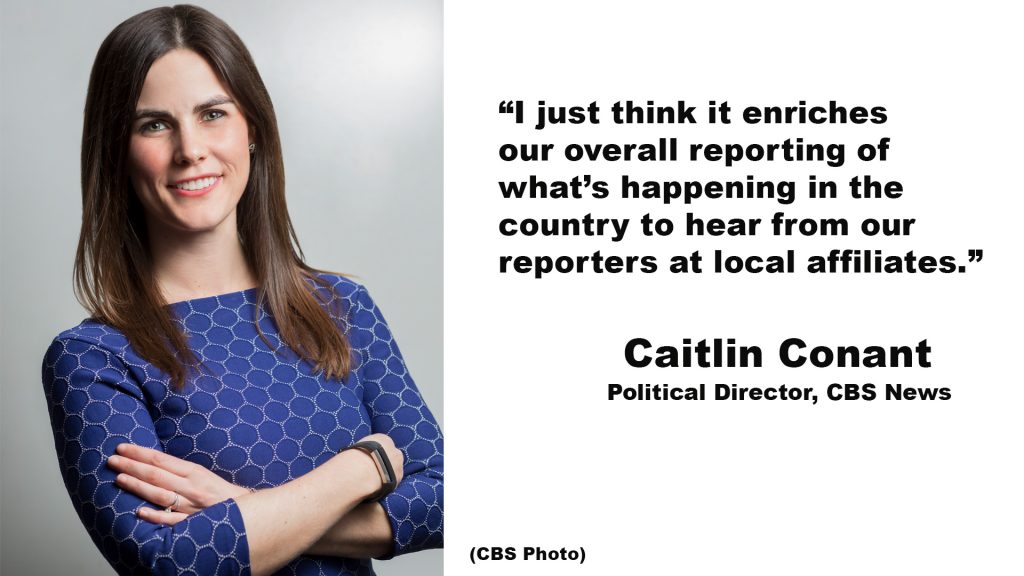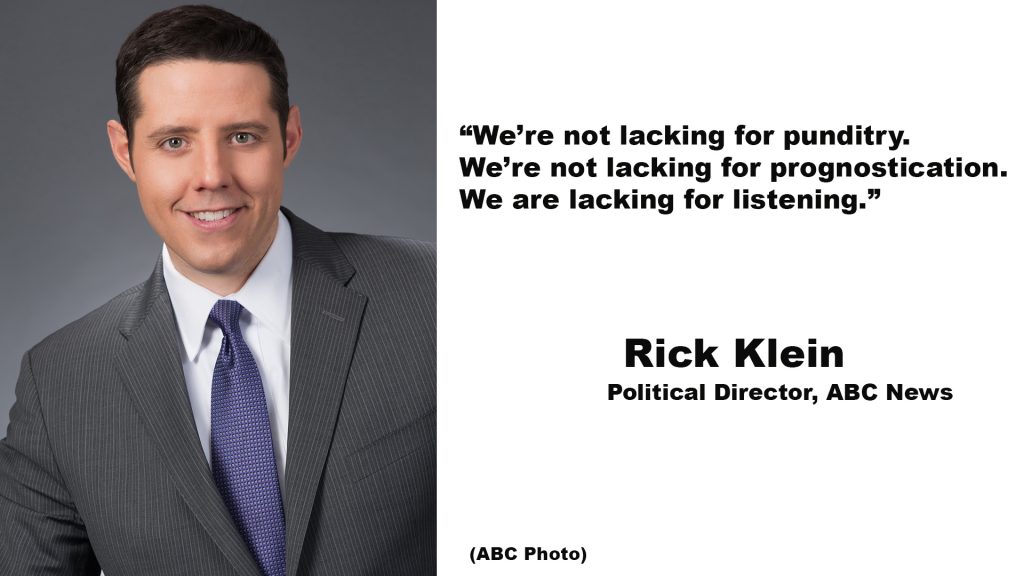
“A great disservice to the audience.”
That’s how ABC News president James Goldston described the inaccurate assumptions that drove flawed coverage of the last presidential election. With 20/20 hindsight, mainstream media missed the story. With 2020 foresight, network news executives are determined not to let that happen again.
That’s why Goldston and his counterparts, NBC’s Noah Oppenheim and (my former colleague) Susan Zirinsky of CBS, all promise to do a better job this time reporting on what’s really happening among voters around the country. In their first joint appearance, at a conference on “The Future of News” sponsored by the Financial Times, Oppenheim said: “It’s all about those journalists on the ground, telling the story from the ground up.” Zirinsky added: “I feel that in this election, our job is to reveal America to itself.”
The suave British moderator moved on, leaving undiscussed the three executives’ most potent asset in covering the next election: their networks of 200-odd owned stations and affiliates — a journalistic resource no other news organization can match. And it turns out that even at this early stage of the campaign, each of the broadcast networks is taking significant steps to take advantage of this unique alliance.
NBC News
“There has not traditionally been a great editorial relationship between network and local,” admits Chuck Todd, moderator of NBC’s Meet the Press. “ABC, CBS, NBC should never miss anything, considering how much saturation we all technically have in the country…but we have not been able to harness this power.” Todd, who calls the stations an “incredible resource,” is determined to change that. Since April of last year, Todd has been conducting meetings with executives and politics experts from stations around the country, starting with NBC affiliates from different ownership groups but now focusing on individual states.

Todd recently held a Texas session focused on immigration — and came home impressed. “It was a reminder that we actually have some experts in this field. They just happen to be affiliates of NBC News in Texas.” Todd told me he plans to continue meeting with stations right up to next year’s national party conventions. He sees the relationship as a two-way proposition, offering to share resources like a tool that measures campaign spending in any media market. “I’ll share that with any NBC affiliate that wants to track what money is being spent locally. That’s how network-local affiliate partnership should work, right? I can afford to do something on a national scale. And the local affiliates can benefit from it. So these are the little things that we’re trying to do to build some trust, rebuild some trust.”
CBS News
“There is a conception, and it’s probably fair, that the national reporters pop in every four years for the presidential campaign,” says Caitlin Conant, Political Director at CBS News. “And the local reporters in those markets are able to provide some context on not only how things have evolved in their state, but also what is going to affect not just how voters vote on election day, but why they vote.”
In addition to providing local expertise, a close collaboration with affiliates enables the network to hear from more voters in more locations, Conant says. “I want to make sure that we’re in as many places as we can be, so that we’re not only covering the horse race, but we’re talking to voters, and we are making sure that we’re not missing the issues that matter to them.”

CBSN, the network’s 24/7 streaming service, has a regular feature called Local Matters that showcases local journalists, including affiliate reporters. Conant hopes the stations will help keep CBS News on top of a potentially fast-changing story. “Because I think the last thing we want to do in this election is assume anything,” she says. “And the last election just taught us that things are unpredictable. We have to be flexible. And we have to rely on our eyes and ears on the ground, because DC and New York can be very much a bubble.”
ABC News
Rick Klein, Conant’s counterpart at ABC News, also sounds a cautionary note about the danger of assumptions. “I’ve repeated a phrase over and over again to my team since 2016,” he says, “which is to ‘embrace the uncertainty.’ It’s critically important that we think about what we don’t know. And a big piece of that is working with our local reporters. That’s a big strength that the networks have: newsrooms that are actually in the communities all around the country.”
That’s why Klein has regular conference calls with news directors from ABC O-and-O’s and affiliates, who give him feedback on ABC’s coverage and tip him off to critical local issues. Klein’s pitch whenever he talks to his local colleagues: “Tell us what you’re hearing from viewers, from your neighbors. We can never get too much intelligence about what people are talking about, what people are interested in.” He also sets aside an hour a week for on-air talkbacks with local anchors.

All three networks have a corps of dedicated campaign reporters, referred to informally as “embeds,” and some of them are already “embedded” not just in key early-voting states but in affiliate newsrooms. “It means that we’ll have reporters who every day are engaging with the newsroom there,” says Klein. “They’re going to be actually breathing the same air and thinking about stories the same way.”
As the election campaign heats up over the next year, please help us here at the Knight-Cronkite News Lab find interesting examples of collaboration and innovation at both networks and stations. “The relationship with the network is very much a two-way street,” says Klein. “We entirely value their input, their feedback, and we want to hear what they’re hearing.”
For now, network executives are saying all the right things and — wait for it — listening.